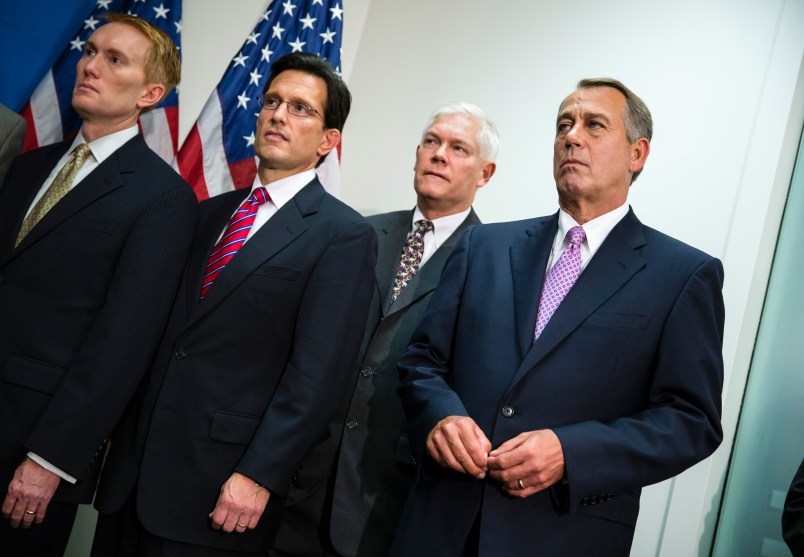The GOP is splintering over its strategy to force conservative reforms by sustaining the government shutdown and threatening default.
Republican leaders don’t know what they want, other than for Democrats to accede to some sort of policy concessions in order to avert the crises. And they’re divided on which of the two must-pass bills is the better one to hold hostage.
Two op-eds this week by House Majority Leader Eric Cantor (R-VA) and Budget Chairman Paul Ryan (R-WI) make no demands about unwinding Obamacare — the party’s central objective in the showdowns, which Senate Democrats have repeatedly quashed. And that has left Republicans lost on what to ask for or to placate their demanding base.
Ryan’s op-ed published Tuesday evening in the Wall Street Journal didn’t even mention Obamacare and instead suggested entitlement reforms to replace across-the-board spending cuts under the 2011 debt ceiling law. Cantor’s op-ed, also published late Tuesday, in the Washington Post is abstract attack on President Barack Obama that steers clear of any specific demands; it merely calls for budgetary negotiations as a prerequisite to averting the crises.
“Mr. President,” Cantor implores, “let’s sit down and talk. Let’s reach consensus and end the ‘my way or the highway’ attitude once and for all.”
Even as his party scales back its Obamacare demands — from defunding it to delaying it to dismantling nonessential parts of it — Speaker John Boehner (R-OH) on Wednesday bashed the law over problems with the insurance marketplaces that opened for enrollment last week. “What a train wreck,” he declared on the House floor. “This is why we need to sit down and have a conversation about the big challenges that face our country.”
Markets are reacting negatively to the specter of breaching the Oct. 17 debt ceiling deadline. Wall Street is pressuring Congress to act. Many polls show Republicans shouldering most of the blame for the shutdown, which is now in its ninth day. Even conservative groups that pushed for a shutdown confrontation are saying the borrowing limit should be raised. They want Republicans to continue the Obamacare fight on the funding bill, a strategy that runs contrary to GOP leaders who see the debt ceiling as the better venue to push their demands.
Senate Democrats have steadfastly held to their demand that Congress act to reopen the government and avert default before bipartisan budget negotiations.
“When a ship is headed toward rocks, the reasonable thing to do is steer away — and then work on charting a better course,” said Senate Budget Chair Patty Murray (D-WA) on Wednesday. “When a government is shut down and is headed toward a default that economists say would be catastrophic, the reasonable thing to do is end the crisis, steer away from the next one, and then work together on a long-term plan to avoid these crises in the future.”
For the 21st time, she called for House-Senate budget negotiations, which would occur after the government re-opens at status quo levels. For the 21st time, Republicans blocked the request, signaling that they’re not ready to let go of the hostages yet.
Boehner told reporters on Tuesday it would be “unconditional surrender” for Republicans to re-open the government or avert default with no strings attached. But his options are narrowing as Obama and Democrats refuse to budge. GOP aides also refuse to say what compromises the party would be willing to make in a budget agreement, fueling Democrats’ fears that Republicans merely want unilateral concessions.
This week, Senate Democrats plan to advance a bill to lift the debt ceiling cleanly until the end of 2014. They’ll need at least six Republicans to break a filibuster. If they succeed, as Democratic leaders are banking on, it would leave the GOP without any clear demands — or unity — as the country barrels toward an unprecedented and catastrophic default on the debt.






